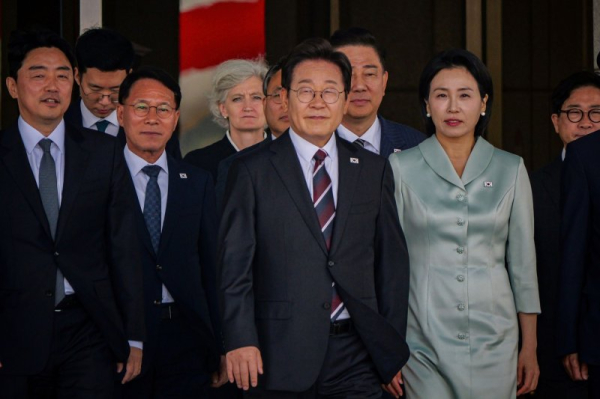

South Korean President Lee Jae Myung (C) called for a government emergency response system on Monday to address the growing crisis in the Middle East. Lee, who attended the G7 meeting in Canada last week, will not travel to the upcoming NATO Summit due to the Middle East situation, his office said. File Photo by Thomas Maresca/UPI | License Photo
South Korean President Lee Jae Myung on Monday instructed government ministries to operate under an emergency response system in the wake of U.S. strikes on Iran’s nuclear sites, his office said.
In his first meeting with senior aides since taking office earlier this month, Lee called the Middle East situation “very urgent” and ordered safety measures for South Korean citizens in the region as the Israel-Iran conflict intensifies.
He also directed ministries to address the economic fallout from the Middle East crisis, including adding measures to an upcoming supplementary budget, if necessary.
“Due to this growing uncertainty, the economic situation — especially the foreign exchange, financial and capital markets — is becoming considerably unstable,” he said.
“I am concerned that inflation will start again due to an increase in oil prices,” he added.
On Sunday, the president’s office announced that he would not travel to the Netherlands this week to meet with NATO leaders due to the situation in the Middle East.
Lee had been considering attending the NATO Summit, which will take place on Tuesday and Wednesday in The Hague, to discuss tariffs and defense cost-sharing with U.S. President Donald Trump.
After the U.S. bombing of three nuclear sites in Iran this weekend, however, Lee canceled plans, citing the growing uncertainty in the region.
“Despite the many pending national issues since taking office, the president has been actively considering attending the NATO summit,” spokeswoman Kang Yoo-jung said in a written briefing on Sunday.
“However, considering various domestic issues and uncertainties due to the Middle East situation, he has decided that it is impossible for him to attend in person,” Kang said.
Trump is pressuring NATO member states to increase defense spending to 5% of GDP. U.S. Defense Secretary Pete Hegseth last week said that Asian allies such as South Korea should also reach the target, prompting Seoul to assert that its defense spending is already “very high” compared to other countries.
National security adviser Wi Sung-lac will represent South Korea at the NATO gathering in Lee’s place, the presidential office said in a written briefing Monday afternoon.
Other South Korean officials have voiced concerns about the security and economic impacts of the latest escalation in the war between Iran and Israel.
Acting Finance Minister Lee Hyoung-il on Monday warned of heightened volatility in global financial and energy markets after the U.S. involvement in the conflict.
“Following the U.S. airstrikes, Iran’s parliament passed a motion to close the Strait of Hormuz, highlighting the significant uncertainty surrounding the situation,” Lee said, according to news agency Yonhap. “Global oil prices have already opened 2 to 3% higher today, signaling increased volatility in international energy markets.”